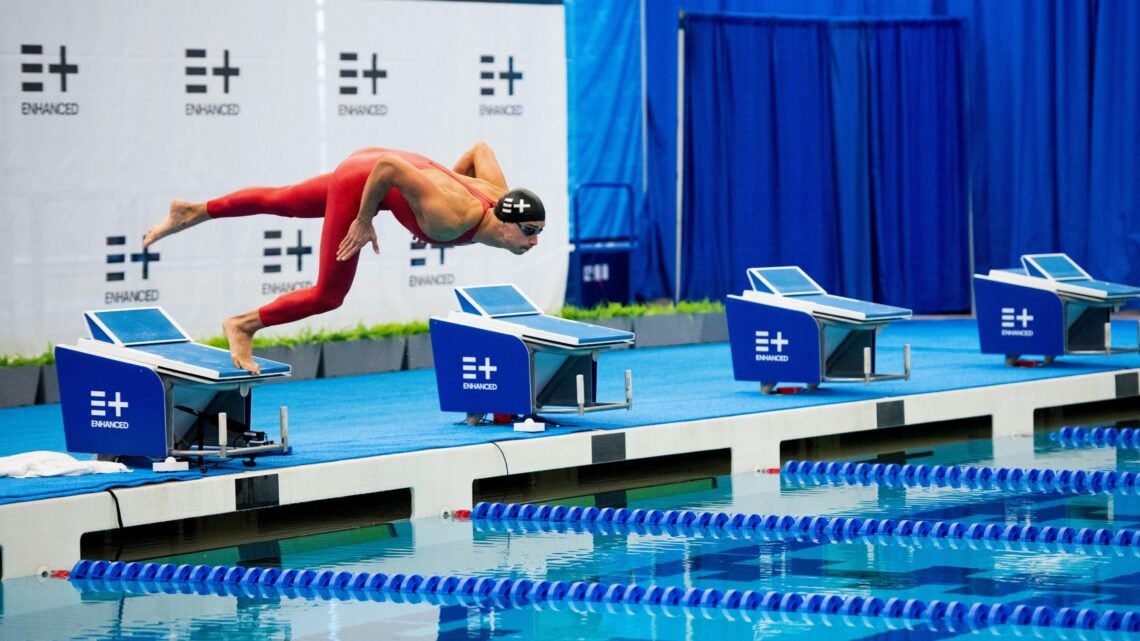Introduction to the Tokyo Olympics 2025
The Tokyo Olympics, officially held in 2021 but retaining the 2020 branding due to the COVID-19 postponement, were a spectacle of resilience and athletic brilliance. Swimming, one of the most anticipated events, showcased remarkable performances at the Olympic Aquatics Centre. This article dives into the new records set during the swimming events, exploring the athletes, races, and factors that made these achievements unforgettable.
A New Era for Olympic Swimming
The Tokyo 2020 Olympics introduced a record-breaking 37 swimming events, including the debut of the men’s 800m freestyle, women’s 1500m freestyle, and the mixed 4x100m medley relay. These additions brought fresh opportunities for athletes to etch their names in history. Despite challenges like the absence of crowds and a year-long delay, swimmers delivered jaw-dropping performances that redefined what’s possible in the pool.
Why Tokyo 2025 Swimming Stood Out
The swimming events were a blend of emerging stars and seasoned champions, with the Olympic Aquatics Centre serving as the stage for intense competition. The introduction of new events and the pressure of a post-pandemic world added layers of intrigue. Fans witnessed a mix of world records, Olympic records, and personal bests, making every race a potential history-maker.
World Records Broken at Tokyo 2020
Despite speculation about slower times due to the unique circumstances of the Games, several swimmers shattered world records. Below are the standout performances that redefined swimming history in Tokyo.
Caeleb Dressel’s Men’s 100m Butterfly Record
Caeleb Dressel, the American sprint king, set the pool ablaze with a world record in the men’s 100m butterfly, clocking 49.45 seconds. His explosive start and relentless pace left competitors like Kristof Milak in his wake. This record-breaking swim solidified Dressel’s status as one of the greatest sprinters in Olympic history.
U.S. Men’s 4x100m Medley Relay Record
The U.S. team, featuring Ryan Murphy, Michael Andrew, Caeleb Dressel, and Zach Apple, smashed the world record in the men’s 4x100m medley relay with a time of 3:26.78. Their seamless transitions and raw power showcased the depth of American swimming talent. This victory was a testament to teamwork and precision under pressure.
Olympic Records Set in Tokyo
Beyond world records, numerous Olympic records were established, reflecting the high level of competition. Here’s a look at some of the most notable.
Katie Ledecky’s Dominance in the Women’s 1500m Freestyle
Katie Ledecky, the queen of distance swimming, claimed the inaugural women’s 1500m freestyle with an Olympic record time of 15:37.34. Her commanding lead from start to finish was a masterclass in endurance. This event, new to the Olympic program, highlighted Ledecky’s unparalleled prowess in long-distance races.
Bobby Finke’s Surprise in the Men’s 800m Freestyle
Bobby Finke, a relatively new face, stunned the swimming world by winning the men’s 800m freestyle with an Olympic record of 7:41.87. His final-lap surge was a game-changer, proving that strategy and stamina can outshine even the most favored competitors. Finke’s win marked a new chapter for American distance swimming.
Ariarne Titmus’ Breakthrough in the Women’s 400m Freestyle
Australia’s Ariarne Titmus outdueled Katie Ledecky in the women’s 400m freestyle, setting an Olympic record of 3:56.69. The race was a clash of titans, with Titmus’ tactical brilliance shining through. Her victory signaled a shift in the freestyle hierarchy, thrilling fans worldwide.
Key Athletes Who Shined
The Tokyo Olympics 2025 saw both veterans and newcomers make their mark. Let’s explore the athletes who defined the swimming events.
Caeleb Dressel: The Sprint Sensation
Dressel’s five gold medals, including three individual titles, made him the star of Tokyo. His 100m butterfly world record was a highlight, but his leadership in relay events was equally impressive. Dressel’s charisma and work ethic resonated with fans, making him a household name.
Katie Ledecky: The Distance Queen
Ledecky’s performance, while not her most dominant Olympics, was still extraordinary. Her gold in the 1500m freestyle and silver in the 400m freestyle showcased her versatility. At 24, Ledecky proved she remains a force to be reckoned with.
Ariarne Titmus: Australia’s Rising Star
Titmus’ victories over Ledecky in the 200m and 400m freestyle events were defining moments. Her Olympic record in the 400m freestyle and relentless drive earned her the nickname “The Terminator.” She’s now a cornerstone of Australia’s swimming legacy.
Emma McKeon: Australia’s Medal Machine
Emma McKeon became Australia’s most decorated Olympian at Tokyo, winning four golds and three bronzes. Her individual titles in the 50m and 100m freestyle, along with relay successes, highlighted her versatility. McKeon’s consistency under pressure was awe-inspiring.
Factors Behind the Record-Breaking Performances
Several elements contributed to the record-breaking swims in Tokyo, from training innovations to the unique Olympic environment.
Impact of the COVID-19 Delay
The one-year postponement forced athletes to adapt their training. Many, like Adam Peaty, noted the lack of international racing and training camps, yet top swimmers thrived. The delay allowed for refined strategies, contributing to faster times despite initial setbacks.
Pool Conditions and Speculation
Media speculated that the Tokyo pool was “slow” due to its 3-meter depth, compared to deeper pools in previous Olympics. However, the world and Olympic records set debunked this theory. Swimmers like Dressel and Ledecky proved that elite performance transcends pool conditions.
Training Innovations
Athletes leveraged advanced data analytics and recovery techniques to peak in Tokyo. For instance, Dressel’s focus on underwater dolphin kicks gave him an edge in sprints. These innovations, combined with mental resilience, fueled record-breaking swims.
Comparison: Tokyo 2020 vs. Previous Olympics
How did Tokyo’s swimming events stack up against past Games? Let’s break it down.
| Olympics | World Records Broken | Olympic Records Set | Notable Performers |
|---|---|---|---|
| Rio 2016 | 8 | 12 | Michael Phelps, Katie Ledecky |
| Tokyo 2020 | 2 | 10+ | Caeleb Dressel, Ariarne Titmus |
| Paris 2024 | 4 | 15+ | Léon Marchand, Katie Ledecky |
- Rio 2016: Known for Michael Phelps’ final Olympic haul, Rio saw more world records due to deeper pools and peak performances.
- Tokyo 2020: Fewer world records but a high number of Olympic records, reflecting the competitive depth despite the pandemic.
- Paris 2024: A resurgence in world records, with Léon Marchand stealing the show, suggesting a return to pre-COVID performance levels.
Pros and Cons of the Tokyo Swimming Events
Pros
- New Events: The addition of the men’s 800m freestyle, women’s 1500m freestyle, and mixed medley relay expanded opportunities.
- Emerging Stars: Athletes like Finke and Titmus brought fresh excitement to the sport.
- Resilience: Swimmers overcame the pandemic’s challenges, delivering inspiring performances.
Cons
- No Crowds: The lack of spectators reduced the electric atmosphere, impacting some athletes’ motivation.
- Doping Controversy: Reports of 23 Chinese swimmers testing positive for a banned substance before Tokyo raised questions about fairness.
- Slower Times in Some Events: Certain races saw slower winning times compared to Rio, sparking pool depth debates.
People Also Ask (PAA) Section
What new events were introduced at the Tokyo 2020 Olympics?
The Tokyo Olympics added the men’s 800m freestyle, women’s 1500m freestyle, and mixed 4x100m medley relay, bringing the total to 37 events. These additions aimed to increase gender equality and diversify competition.
Who broke world records in swimming at Tokyo 2020?
Caeleb Dressel broke the world record in the men’s 100m butterfly (49.45 seconds), and the U.S. men’s 4x100m medley relay team set a new mark (3:26.78). These were the only two world records in pool swimming.
Why were some swimming times slower in Tokyo?
Speculation pointed to the pool’s 3-meter depth, which may have caused more waves, and the lack of crowd energy. However, top swimmers still set records, suggesting individual preparation was key.
How did the COVID-19 pandemic affect swimmers?
The pandemic limited training access and international competitions, but many swimmers adapted with home-based workouts and mental conditioning. Their resilience led to strong performances despite the challenges.
The Emotional Impact of Tokyo’s Swimming Triumphs
Watching Caeleb Dressel sprint to a world record felt like witnessing lightning in a bottle. As a lifelong swimming fan, I remember holding my breath during his 100m butterfly, marveling at his raw power. Similarly, Ariarne Titmus’ upset over Katie Ledecky in the 400m freestyle was a heart-pounding moment that showcased the beauty of competition. These moments weren’t just about times; they were about human spirit, grit, and the will to overcome a global crisis.
How to Follow Olympic Swimming
Where to Get Official Results
For detailed results, visit Olympics.com or World Aquatics. These platforms offer real-time updates, athlete profiles, and video highlights.
Best Tools for Staying Updated
- SwimSwam: A go-to for swimming news and analysis.
- NBC Olympics App: Streams live events and replays.
- World Aquatics App: Provides schedules and results for global competitions.
Where to Watch Replays
Relive Tokyo’s swimming moments on Olympics.com or the NBC Sports app. YouTube channels like World Aquatics also feature highlight reels.
FAQ Section
Q: How many swimming events were there at Tokyo 2020?
A: There were 37 events, including 18 for men, 18 for women, and one mixed event, plus two open-water marathons.
Q: Who won the most medals in swimming at Tokyo 2020?
A: Emma McKeon of Australia won seven medals (four golds, three bronzes), making her the most decorated swimmer.
Q: Were there any controversies in Tokyo’s swimming events?
A: Yes, 23 Chinese swimmers tested positive for a banned substance before the Games but were cleared to compete, sparking debate.
Q: How did the pool depth affect performances?
A: The 3-meter pool depth led to speculation about slower times due to increased waves, but record-breaking swims showed top athletes overcame this.
Q: Can I access Tokyo 2020 swimming data for research?
A: Yes, official results are available on Olympics.com and WorldAquatics.com for detailed analysis.
Looking Ahead: The Legacy of Tokyo 2020
The Tokyo Olympics 2025 swimming events left an indelible mark on the sport. From Caeleb Dressel’s sprint dominance to Katie Ledecky’s distance mastery, the records set were more than numbers—they were stories of perseverance. The introduction of new events and the rise of athletes like Ariarne Titmus and Bobby Finke set the stage for future showdowns. As we look to the 2028 Los Angeles Olympics, the legacy of Tokyo will inspire the next generation to chase greatness in the pool.





